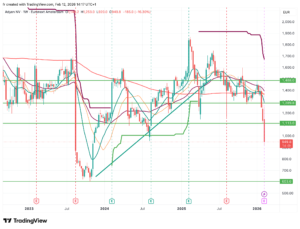$BTC $ETH #ArtificialIntelligence #TechRegulation #RickScott #NoAdversarialAIAct #USPolicy #TechNews #AI #Cybersecurity #Legislation #TechEthics
Will Senator Rick Scott’s New “No Adversarial AI Act” Protect Us From Dangerous Tech?
In the realm of technology and legislation, the new news of Senator Rick Scott’s introduction of the “No Adversarial AI Act,” officially known as S. 2177, is stirring discussions across various sectors. As artificial intelligence technologies rapidly evolve, the need for robust regulatory frameworks becomes increasingly apparent. This legislation aims to address the potential threats posed by adversarial AI, but how effective can it be in safeguarding against these emerging risks?
Understanding the “No Adversarial AI Act”
The bill proposes stringent measures to regulate the development and use of AI systems that could potentially act against American interests. Senator Scott’s initiative reflects a growing concern among lawmakers about the unchecked advancements in AI technology, particularly those that might be exploited for malicious purposes. By setting clear legal boundaries, the Act seeks to prevent adversaries from utilizing AI in ways that could threaten national security or individual privacy.
Implications for the Tech Industry and Beyond
The implications of this legislative move are broad and significant. For the tech industry, it introduces a new layer of compliance that could affect everything from R&D budgets to product timelines. Moreover, it raises important questions about the balance between innovation and security. Companies developing AI technologies might need to navigate these regulations carefully to continue their work without crossing legal boundaries.
Potential Challenges and Criticisms
However, the Act is not without its critics. Some argue that the measures might stifle innovation by imposing too restrictive frameworks that deter experimentation and development. Additionally, there are concerns about the practicality of enforcing such a law, given the global and often nebulous nature of technology development and deployment.
A Closer Look at Safety and Security
Ensuring the safety and security of AI technologies is paramount. The “No Adversarial AI Act” aims to create a safer digital environment by preventing the misuse of AI. This preventative approach is crucial in an era where digital threats can have real-world consequences, affecting everything from electoral processes to personal data security.
Conclusion: A Step in the Right Direction?
As we delve deeper into the age of digital transformation, the introduction of bills like S. 2177 is a testament to the proactive steps legislators are taking to keep pace with technological advancements. While there are challenges and criticisms to address, the overarching goal of protecting society from potentially harmful technologies is commendable. Only time will tell how effective these measures will be, but for now, it appears to be a step in the right direction in the ongoing dialogue between technology and law.
For more insights into how such legislation impacts the stock market, visit our financial news section. To explore how these developments could influence the cryptocurrency sector, consider visiting Binance for further information.











Comments are closed.